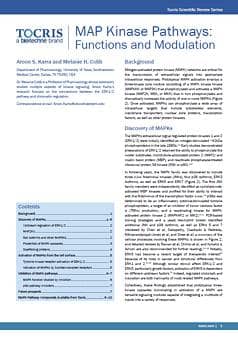MAPK Signaling
The mitogen-activated protein kinase (MAPK) family is a group of serine/threonine kinases that mediate intracellular signaling. The activation of MAPK involves a cascade consisting of MAPK kinase (also known as MAPKKK or MEKK) that activates MAPK/ERK (also known as MAPKK or MEK). This stimulates a phosphorylation-dependent increase in the activity of MAPK.
Upon activation, MAPK can phosphorylate a variety of intracellular targets including transcription factors, transcriptional adaptor proteins, membrane and cytoplasmic substrates, and other protein kinases. Three major groups of MAPK cascades have been determined: ERK1/ERK2, JNK/SAPK and p38 MAPK.
Literature for MAPK Signaling
Tocris offers the following scientific literature for MAPK Signaling to showcase our products. We invite you to request* your copy today!
*Please note that Tocris will only send literature to established scientific business / institute addresses.
MAPK Signaling Scientific Review
MAP kinase signaling is integral to the regulation of numerous cellular processes such as proliferation and differentiation, and as a result is an important focus of cancer and immunology research. Updated for 2016, this review discusses the regulation of the MAPK pathway and properties of MAPK cascades. Compounds available from Tocris are listed.


